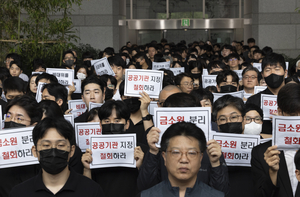Seoul’s sweeping reform plan faces agency protests, union unrest, tough road in Assembly
South Korea is facing turbulence as it prepares its first major restructuring of financial regulators in 17 years, with resistance inside the agencies and looming legislative battles.
The government and ruling Democratic Party are set to submit a bill to the National Assembly on Sept. 25 to strip the Finance Ministry of its budgeting authority and create a new Budget Office under the prime minister.
In parallel, the administration plans to merge the Financial Services Commission and the Financial Supervisory Service into a single watchdog. The FSC would be dissolved, with its policymaking powers shifted to a newly configured Finance Ministry. The new body, tentatively called the Financial Supervisory Commission, would come under the prime minister’s control.
If approved, the overhaul would take effect at the start of 2026, marking the first structural shake-up since the 2008 merger of the Ministry of Economy and the Budget Office.
Taking on ‘Mofia’ or boosting presidential control?
The government says the changes are meant to decentralize the Finance Ministry, one of Korea’s most powerful government departments. With its minister serving as deputy prime minister, it controls budgeting, taxation and financial policy, shaping the national budget and economic direction.
That dominance has earned it the nickname “Mofia,” a jab at its grip on fiscal policy and frequent resistance to bigger spending plans.
During his candidacy, President Lee Jae Myung denounced the ministry, saying it was “acting like a king by controlling both economic planning and fiscal affairs.”
Many see Lee’s reform as more a bid to give the presidency greater sway over budget planning. They expect him to use the new Budget Office to facilitate his expansive fiscal agenda by speeding up decision-making and aligning policy with administration priorities.
Critics warn the changes could concentrate power within the administration, undermining checks and balances. Splitting revenue under the Finance Ministry and spending under the Budget Office could also weaken fiscal discipline, a risk compounded by Korea’s worsening public finances.
Passing the overhaul won’t be simple. Amendments to the Government Organization Act will be handled by the Public Administration and Security Committee, but follow-up legislation, including a new law to establish the new watchdog and revisions to the Banking Act, must go through the State Affairs Committee. That panel is chaired by the opposition People Power Party, which has denounced the plan.
Rep. Yoon Han-hong, the committee’s chair, said in a social media post Monday that, “The Lee administration and the ruling Party are crossing the line in disregarding the opposition.” He called the proposal a “backroom, hasty plan that shuts out the financial authorities involved and voices from the field.”
If bills get stuck at the committee level, the ruling party could attempt to use the fast-track system, which allows legislation to advance with two-thirds support in a floor vote. But that path could delay enactment by at least six months, leaving a void in regulatory activity. The overhaul will also require sweeping statutory reviews, with hundreds to thousands of laws needing revision.
Beyond politics, the merger of the FSC and FSS, affecting more than 2,000 employees, is already stoking labor unrest.
The backlash is strongest at the FSS, a quasi-private special corporation set to be turned into a public agency under Financial Supervisory Commission. Consumer protection and securities and futures oversight would be spun off into separate units under the commission.
FSS officials have argued the restructuring will weaken independence and create inefficiencies, putting consumers at risk. Hundreds of employees have protested for two days this week, demanding the plan’s withdrawal. The union has threatened a strike if Gov. Lee Chan-jin remains silent.
“The reform is not a solution, but a punishment (for employees),” one union official said Tuesday. “We’re not protesting only for our rights and benefits, but because splitting off the consumer protection foundation and reclassifying the FSS as a public institution will seriously damage the financial industry’s development.”
jwc@heraldcorp.com


